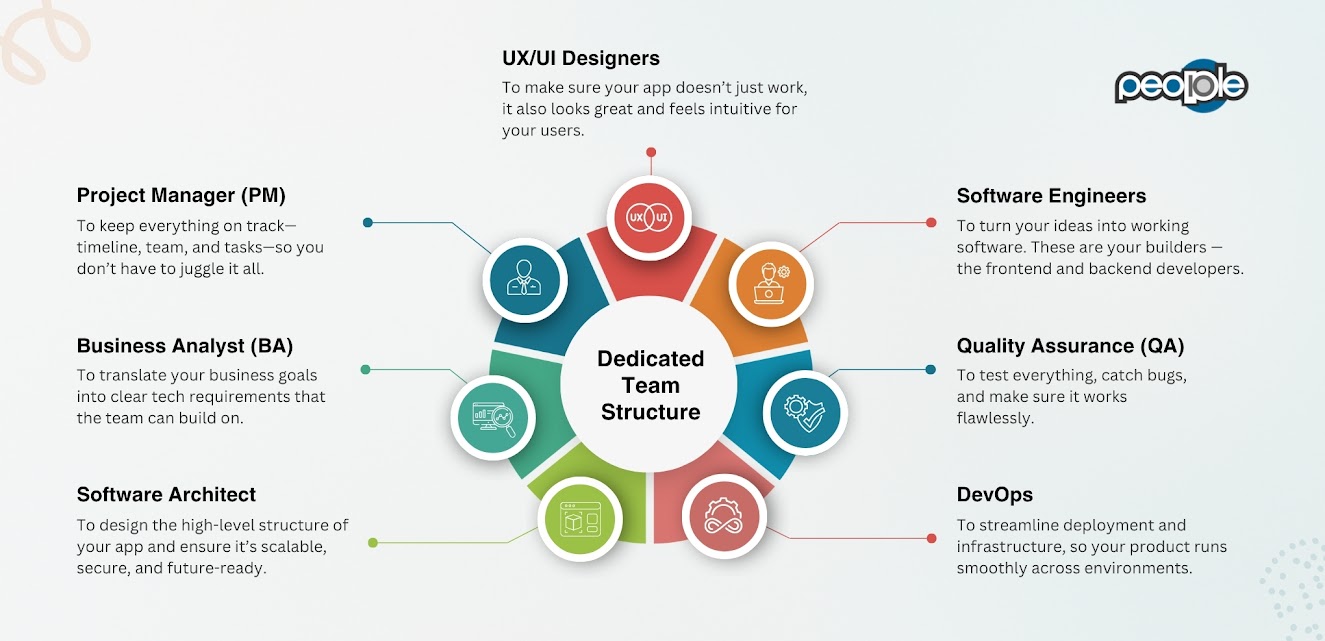Thinking of building your next software product or extensive features but not sure who to hire? We get it. It is a big decision. Should you go with freelancers? Should you build an in-house team? Or maybe, just partner with dedicated software development teams?
There is only one right answer. And it directly affects your speed, quality, and budget.
So, in this article, we will walk you through everything from team structures to understanding your options depending on your requirements. So, you can make the best call for your project.
Let’s dive in.
Which Are the Three Models Used?
Before you hire a software team, it is important to understand the three core models available. Each comes with its strengths, depending on your project’s goals, timeline, and budget.
Here is a quick rundown.
Dedicated Software Development Teams
Development teams are groups of experts who work full-time for a web or software development company.
When you need a project done, you reach out to such firms. They will assign a project manager who builds an extended dedicated team tailored to your needs, often using a dual-shore model that combines the flexibility of offshore resources with the alignment of an onshore presence.
For instance, you might have project managers or key decision-makers based in the US (onshore) while developers, designers, and other experts work remotely from India (offshore).
In other terms, it is like hiring your own team—just that payroll is routed via the partner and also zero overhead costs on top.
This model works best when you are working on a large or ongoing project. It is ideal when your requirements are fluid, and you expect changes along the way. If quality matters and the scope is not fully defined yet, this model gives you the flexibility you need.
Freelancers
Freelancers are independent professionals who offer their services directly. You can hire one or more freelancers to handle specific parts of your project.
It is usually a single-person team, which means quick hiring and lower cost.
If your project is small, time-bound, and you have everything planned upfront, you can go for freelancers. They are perfect when your budget is tight, and the tasks do not require a lot of back-and-forth. If you know what you want and when you need it, this can work well.
But if it is a long-term project, you may want to choose otherwise, as freelancers often juggle multiple clients. So, your project may not always be the top priority.
Additionally, they may leave the project mid-way for better opportunities. Finding replacements for the project will be a difficult task.
In-House Teams
An in-house team means hiring developers, designers, and testers as full-time employees on your payroll. You build and manage this team internally, just like any other department in your company.
Choose this model if you are playing the long game. You will need the time, budget, and structure to support hiring and training.
Although the salaries, benefits, insurance, office space, and equipment may all add up to the company’s cost fast.
Plus, to retain top talent, you will need to offer competitive perks and raises. And there will be bad hires. They are always there.
But in return, you get complete control, deep alignment with your business goals, and total ownership of what gets built. You also stay ready for future tech needs without starting from scratch.
Why Should You Choose a Dedicated Development Team Over Freelancers
Let us understand why a dedicated development team might be the smarter, long-term choice for you.
You Get All Expertise in One Place
With extended dedicated teams, you get all the skills you need under one roof. Whether it is frontend (HTML, CSS, JavaScript) or backend (SQL, PHP, Java, C#), it is easy to get the right mix.
You do not need to run around hiring different freelancers for each task. The project manager can plug in the right experts exactly when you need them.
It is faster, cleaner, and more efficient.
Dedicated Software Development Teams are More Reliable
When opting for an extended dedicated team model, you are not hiring individuals; you are actually working with a company.
That means legal contracts, guaranteed delivery, and accountability.
If someone on the team drops out, they will be replaced without affecting your deadlines. Unlike freelancers, the firm cannot just disappear on you. There is always someone responsible at the other end.
Dedicated Software Development Teams are More Transparent in Communication via Multiple Channels
Extended dedicated teams operate like a well-oiled machine.
They have got structured communication channels—Slack, Teams, email, Zoom—whatever works best for you.
Even across time zones, there is always someone available to respond during agreed-upon hours. So, you can stay in the loop, and nothing gets lost in translation.
Dedicated Software Development Teams Use Authentic Software and Hardware
A proper firm invests in licensed tools, secure systems, and IT support. So, you never have to worry about illegal software or data leaks.
These teams typically adhere to global compliance standards, including GDPR, HIPAA, SOC 2, and others. You can be confident that your product is being built with secure and professional practices (no shady practices here).
Dedicated Software Development Teams are Easily Expandable and Fungible
Yep! For some reason, your project scope has changed, and the dedicated teams can expand or shrink based on your needs.
Let us say your app just went viral due to a TikTok marketing campaign. Now, you will need extra developers—fast. A dedicated team can ramp up overnight.
Or, let us assume your MVP is ready and you want to slow down again. You can simply discuss the adjustments with the project manager assigned to you.
Dedicated Software Development Teams are Cost-Effective
If you are hiring for a long-term project, going ahead with freelancers may look cheaper at first. But soon, you will realize you are paying more—hiring separately for design, backend, frontend, testing, and product management.
With a dedicated team, you get everything bundled, often at offshore rates. You do not pay for benefits or overheads—just results.
For instance, People10 helped a global disaster tech firm save $850K annually. So, that is also a way of having cost effective processes.
Dedicated Software Development Teams offer Fast Development
The team you hire is already experienced in your industry. They have done this before, and they know what works.
Plus, due to timezone differences, you may also get the changes done while you are sleeping. That is real 24/7 progress.
Dedicated Software Development Teams Offer Excellent Staff Management
You do not manage every developer. The company does that for you. From timesheets to performance reviews, everything is handled internally.
You deal with one person—usually a product manager or project lead—who keeps things on track and ensures every milestone is met. It is smooth and hassle-free.
Dedicated Software Development Teams are Easy to Hold Accountable
You are not chasing down individuals. You are working with a business entity.
When something needs fixing or if expectations are not met, you raise it with the project lead. No explaining things in tech jargon. They take it from there, and you get the resolution you need.
Dedicated Software Development Teams Offer Full Control to You
Although they manage the staff, you remain in charge. You can add new features, pause work, or pivot at any time.
Dedicated teams adapt quickly. Whether you want weekly demos or monthly planning meetings—you decide the pace and direction.
You can Use Your Office Resources for Your Core Business
Once you have hired a dedicated team for your project, your internal resources should be working on your business, not stuck managing a dozen freelancers.
For example, if you are a healthcare company, your product managers and compliance experts should focus on regulations and customer experience—not tech hiring. Let the dedicated team handle the development part.
Disadvantages of Hiring Dedicated Software Development Teams
The biggest challenge of hiring dedicated development teams across seas may be the time zones. It can make the real-time meetings tricky, and you might find yourself hopping on late-night or early-morning calls.
But with a little planning and overlapping hours, it is manageable. Many teams even adjust their schedules to suit your availability.
How are the Dedicated Software Development Teams Unique in Terms of Scope, Time & Cost?
The global demand for software is exploding—expected to hit over $850 billion by 2029. That also means the demand for skilled developers is at an all-time high. And the cost to build software? That depends on how you choose to hire.
Cost: Balance Between Value and Budget
In-house developers can cost anywhere between $50K–$150K annually, not including benefits, insurance, or bonuses. Freelancers may charge $20–$120/hour, but managing multiple freelancers gets expensive in time and effort.
With dedicated teams, you get a sweet spot—$25–$150/hour, depending on location and expertise. But the value is much higher. You are not just paying for a coder; you are getting a full team, vetted processes, and expert management—all under one roof.
Time: Faster Execution, Less Overhead
Freelancers may need a lot of hand-holding. You will explain your wireframes, guide them through flows, and probably manage their deadlines yourself. That is time taken away from your actual business.
Dedicated teams already come with managers, structured processes, and experienced developers. You brief them once, and they will ask the right questions. You do not need to micromanage—just align on goals and let them build.
Scope: Built to Scale with You
Got a big idea that may evolve over time? Or not sure what features you will need down the line?
Freelancers may struggle with that.
In-house teams will take time to build.
So, you need dedicated teams for it as they thrive in this space. You can scale up or down as your scope changes. You are not locked into long hiring cycles or scrambling for resources. Everything is built for agility.
Value: More Than Just Cost Savings
Cheap does not always mean cost-effective. Just like bad advice might seem affordable—until it leads you down the wrong path—a cheaper dev might end up costing you more in the long run.
With a dedicated team, you are investing in fewer mistakes, faster delivery, and expert guidance. You are buying peace of mind and momentum for your business.
What is the Structure of Dedicated Software Development Teams and Who to Hire

Here are the key roles you will need in your dedicated team to build and scale your project the right way.
Project Manager (PM)
A Project Manager plans, organizes, and oversees the entire project. They keep the team aligned, track progress, manage deadlines, remove blockers, and communicate with you regularly to ensure everything stays on track.
Business Analyst (BA)
A Business Analyst works closely with you to understand your business goals, user needs, and workflows. They translate these into technical requirements and user stories for the developers to follow—bridging the gap between business and tech.
Software Architect
Software Architect refines the software’s structure, tech stack, and design patterns. They make key technical decisions, ensure the solution is scalable and secure, and guide developers on how to build it the right way from the start.
UX/UI Designers
The UX/UI designers create wireframes, mockups, and visual designs. They focus on crafting smooth user journeys and clean interfaces that are both beautiful and easy to use, improving the overall product experience.
Software Engineers
These are the coders who build your product. Frontend developers work on the visual, interactive parts users see. Backend developers handle the logic, databases, and APIs that power the app behind the scenes.
Quality Assurance (QA)
QAs tests your application across devices, browsers, and use cases. They write test cases, perform manual and automated testing, report bugs, and ensure everything works perfectly before release.
DevOps Engineers
They set up and manage the infrastructure, automate deployment pipelines, and monitor performance. They ensure that updates are smooth, environments are secure, and your software is always running reliably.
How to Hire Dedicated Software Development Teams India
If you have made it this far, chances are you are seriously considering the dedicated team model. Great choice. Now let us walk through how you can build your own development team the right way.
Define your requirements
Start by getting clear on what you need and documenting your requirements.
- What are your goals?
- What will the team work on?
- How will they integrate with your current setup?
- What skills are critical?
- Who will they report to?
And—just as important—how will you measure success?
Documenting this early helps you stay focused and avoid hiring on guesswork.
Source your team software developers
Now comes the exciting part—finding your team.
The process typically begins with screening rounds: HR and technical interviews. Once the candidates are shortlisted, you will get the best-fit candidates for a final call or interview.
You control who will be hired for your project. The firm will just do the initial screening based on their expertise, so you can save time, money, and resources.
But at this stage, you do not just look at skill sets. You take time to understand the company you are working with. What is their work culture like? How do they communicate? Can they adapt to your pace and style?
Once you have the full clarity, you can decide to move ahead with your decision.
Build Your Dedicated Software Development Team with People10
At People10, we have been building high-performing extended dedicated teams for clients all over the world since 2011.
We have worked with clients across industries—Aviation, Manufacturing, Healthcare, Insurance, BFSI, E-Commerce, Logistics, and more.
We make onboarding fast and frictionless. Your team is usually up and running within 30-45 days of signing.
No long-term lock-ins, no unnecessary overheads—just pure delivery focus.
You stay agile, launch faster, and get the right talent without the burden of in-house hiring.
Are you ready to bring your idea to life with a reliable team?
Talk to our experts to understand how a dedicated development team can turn your product vision into reality—on time, and with top-notch quality.
Most Common FAQs About Extended Dedicated Team Model
Outsourcing development team work: How it works?
You partner with a software company that assembles an extended dedicated team for your project. They handle hiring, infrastructure, and management—while you focus on guiding the vision and priorities.
How does the dedicated software development teams model work?
You get a full team of professionals – developers, designers, QA, PM, and more – who work exclusively on your project. They operate like your own remote team, just without the hiring headaches.
When to use a dedicated development team?
It is perfect when you have a medium-to-long-term project, evolving requirements, or need to scale fast without building an in-house team from scratch.
When is an extended dedicated team model a perfect match for your project?
If your project scope is not fixed, timelines are flexible, or you expect future scaling—it is a fit! It is especially useful if you want a full team ready to jump in without long-term contracts.
How to determine the extended dedicated team model is right for your business?
Ask yourself, do I need full control but not full-time hires? Do I want flexibility, speed, and expert delivery without micromanaging? If yes, you are ready for an extended dedicated team.
Author
Shrutha Sekharaiah brings over 13 years of experience in delivering innovative, scalable solutions. His broad expertise in technology and focus on collaboration and mentorship drive the creation of robust systems enhancing efficiency and performance.




